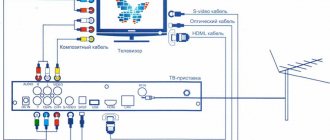Will you be disconnected when switching to digital television?
The transition to a new broadcasting standard will finally reach its climax. Already this year, our country will begin to watch television in a new way, without interference and glitches. Seven regions have already been completely disconnected from analog television on February 11, and about 20 more regions, including Moscow, will be disconnected on April 15. Well, the final chord in the digitalization of the country will be June 3, when the last 57 regions, including St. Petersburg, will say goodbye to analogue television. On the eve of the global shutdown of analog television and the transition to digital broadcasting, many satellite and cable television subscribers began to worry about several issues. You can call a technical specialist to set up digital television in St. Petersburg and the Leningrad region by phone
Is cable digital or analogue television?
Today, millions of people, especially in apartment buildings, use cable television, and only a few enter into an agreement with a provider for digital broadcasting. It turns out that today cable television is in most cases analogue television.
Will cable TV be cut off in 2021?
The general transition to digital broadcasting concerns only terrestrial federal television transmitted over the air. The transition to digital television is aimed at providing the legal right of every citizen to access 20 free programs. Cable television is commercial television and is transmitted via wire communications. It has nothing to do with terrestrial television, so turning off analogue terrestrial television has nothing to do with cable television.
Satellite television Tricolor, MTS and NTV Plus is it analogue or digital?
At the beginning of the 2000s, satellite television, including NTV Plus, was indeed analogue. Now all satellite television, including such widespread providers as Tricolor, NTV Plus, MTS and others, are digital operators.
Will Tricolor, MTS and NTV Plus satellite television be turned off when switching to digital broadcasting?
As I said above, satellite television is a priori digital. In addition, the transition to digital and disabling analogue applies only to terrestrial television. Satellite TV has absolutely nothing to do with it. So I can assure you that with the global transition to digital broadcasting, current and future satellite television subscribers, including Tricolor, will not be left without television . Moreover, for them the transition will be completely invisible. If you are still using the old Tricolor receiver, then I recommend replacing it with a new one for 3990 rubles. I hope this article helped you understand the issues of turning off analog television and get rid of the fears associated with these changes!
Who will not have a working TV starting from the New Year?
Starting from the new year, state funding for analogue television broadcasting will cease in those settlements where fewer than one hundred thousand people live. In this regard, the Ministry of Telecom and Mass Communications expects that regional and municipal authorities will help the population painlessly master a new type of television broadcasting - digital.
They won’t leave the outback without multiplexes
Without going into technical details, the essence of digital television is that not one channel can broadcast on one frequency, as in the analogue era, but 10 at once - “multiplex”. At the moment, two multiplexes have been formed, with 20 television and three radio channels. The only cost is the need to purchase additional equipment for owners of outdated television receivers.
Circulation of "Murzilka" will take off
The country has been switching to digital terrestrial television for 10 years, and now more than 98 percent of Russians can receive it. How to make sure that in January 2019 the remaining two percent of citizens do not end up in front of screens with “white noise”, and local television companies do not have an audience? Senators discussed this issue with representatives of regional television companies and with Deputy Head of the Ministry of Telecom and Mass Communications Alexey Volin
July 24.
According to the official, his department ordered a large sociological study of several tens of thousands of participants, which will provide a snapshot not only of the Russian Federation as a whole, but of each of its subjects separately.
“Then we will understand how many of our residents use analog television today,” Volin explained. — One of the difficulties is that asking a person directly whether he uses analog or digital is pointless, because he does not know. Therefore, we will find out everything through a complex of different questions. For example, how many channels are received, are there any paid channels.”
1.4 percent of Russians live outside the coverage area of digital terrestrial television.
According to preliminary estimates by the ministry, approximately 1.4 percent of Russians live outside the coverage area of digital terrestrial television. “So that they have the opportunity to watch digital TV, last year we agreed with major satellite television operators. So, in Yakutia, when instead of one satellite operator there were three, prices were reduced threefold. For residents who are registered in settlements outside the digital broadcasting zone, operators will make a preferential offer,” the deputy minister said at a meeting in the Federation Council.
Preferential conditions will include a 30 percent discount on a set of equipment. Also, residents of such settlements will not pay a subscription fee for use or NTV Plus. We are talking about a basic package of 20 channels, Volin explained. “I do not rule out the possibility that already in 2021 a similar requirement for satellite service operators may be fixed at the legislative level,” he noted.
Here the Ministry of Telecom and Mass Communications is very important to help local authorities, especially at the municipal level. “We will ask them to compile lists of subscribers and help people organize for centralized ordering of equipment,” the official informed.
For residents who are registered in settlements outside the digital broadcasting zone, operators will make a preferential offer.
Senators will help connect regional authorities so that they inform the population through their structures, promised the first deputy chairman of the Federation Council Committee on Constitutional Legislation and State Building Lyudmila Bokova
. “It is important for us that remote areas are not left behind,” she told the Parliamentary Gazette. “We need to study the state of affairs in the regions and propose a suitable solution - somewhere by laying optical fiber, somewhere by purchasing special devices.”
Some subjects, for example, the Astrakhan region and the Nenets Autonomous Okrug, have solutions that other regions can use, the legislator recalled. “Of course, we need to pay a lot of attention to informing the population about what awaits people in the near future. Without this, it is difficult to navigate, especially for older people. If they start showing explanatory videos only in October, then it’s probably too late,” says Lyudmila Bokova.
The “21st button” problem has not yet been resolved
TV channel “Health” will help you live without diseases
Senator from the Omsk region
Elena Mizulina
drew attention to the problem of the so-called “21st button”. This is a mandatory public channel on regional television, which, however, did not make it into the top twenty free TV channels.
“People are accustomed to regional and municipal channels, and the feds understand perfectly well that without state support, on advertising alone, they will not be able to exist... If we do not now defend the right of the regions to free broadcasting, then in a few years we will be forced to spend much more money, recreating the local television network,” the legislator stated.
In her opinion, the Western model, with local television, will not work in Russian conditions: “In the Omsk region, we have cable networks in three or four districts out of 31. It turns out that without our regional television the region will be cut off from its news.”
First Deputy Chairman of the Public Chamber Commission for the Development of the Information Society, Media and Mass Communications Alexander Malkevich
In support of Elena Mizulina’s fears, he cited the example of a republican television company in Karelia, which had to be created “from scratch” at great expense after the previous governor refused such a resource several years ago.
Soda advertising may be banned
Stepan Parfenov, general director of the Penza TV and Radio Broadcasting Company "Express".
.
“That is, to allow the use of radio frequencies for digital television broadcasting of the DVB-T2 standard,” he explained. — The key criterion should be the absence of the possibility of multiplexing, that is, adding other TV channels. In other words, one frequency means one obligatory public television channel of a constituent entity of the Russian Federation.”
There are several ways that can be seen “head-on”, says Senator from Sevastopol Olga Timofeeva
.
“The first thing is to include a regional channel in the first multiplex, sacrificing one of the existing ones. You can also reconsider the composition of the channels of the second multiplex, almost all of which are entertainment and commercial channels. After all, television is the tool for communication with the outside world that the older generation uses. The next question is related to the organization of the third multiplex. It is not yet clear at whose expense it will be implemented; here we come down to finances. The third option is to try to solve the problem through telecom operators, but then we are moving away from the legal requirement that there should be a single provider of television and radio communications services,” Timofeeva listed possible options.
The final decision was postponed until the fall in order to calculate each of the options.
Who should be afraid of the cancellation of analogue television broadcasting in Russia
In 2021, analogue broadcasting will have to be turned off, that is, the method by which the television signal has been distributed over the air for all the decades that television has existed as such.
The analog signal transmission method has many disadvantages. First of all, this is signal loss during its delivery and, as a result, worse picture and sound quality compared to the digital format. The second drawback is that one analog channel occupies one frequency on the air, which means that the number of different TV channels that can be distributed either over the air or via cable is limited.
Digital solves these problems. Firstly, the quality of the picture and sound with this method remains the same as they were intended by the TV program producers. Secondly, a dozen TV channels are broadcast at once on one frequency, so the possibilities for expanding the “assortment” for TV viewers become completely different.
Those Russians whose television receivers support digital signal reception do not need to worry. They are already ready to turn off analog TV.
Those whose TV itself is quite old and does not receive a digital signal can use special set-top boxes. There are also plenty of such families in Russia, and the shutdown of analogue television will also not affect them.
Only those who have old or relatively old TVs need to be afraid of the cancellation of analogue broadcasting, and there is also no set-top box for decoding the digital signal for this TV.
Photo: minsvyaz.ru











